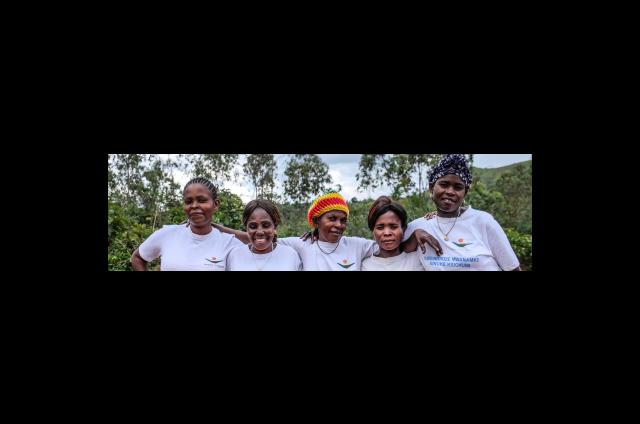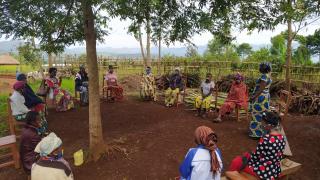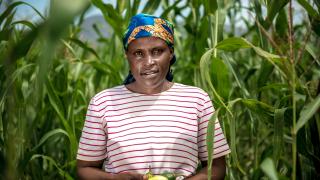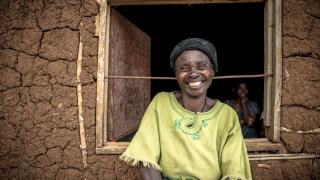RCT Impact results
Impact Evaluation in the Democratic Republic of Congo
Sharing our research results from four communities in South Kivu
Women for Women International has been implementing its one-year programme in North and South Kivu provinces in the Democratic Republic of Congo (DRC) since 2004. In collaboration with researchers at the University of Washington, University of Texas at Austin, Women for Women International conducted a 24-month randomised control trial (RCT) in four communities in South Kivu, DRC from 2017 to 2019.
The study measured the impacts of the 12-month social and economic empowerment programme on women’s livelihoods, savings and assets, social empowerment, well-being, and social assets a year after programme completion. Researchers also examined the potential additional impact on women participants of having a male household member join a concurrent Men’s Engagement Programme (MEP).
The research showed that women’s participation in the one-year programme led to significant gains in gross earnings, use of savings and average amount of savings, access to credit, and assets, one year after programme completion.
Compared to women in the control group, graduates of the programme increased participation in household decision-making, reported higher feelings of control of their lives, diversified household diets, had lower rates of anxiety, and increased social inclusion and support networks.
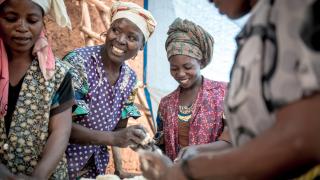
The research also highlighted areas for improvement: women’s overall attitudes about gender norms and women’s reported experiences of intimate partner violence did not change during this study period. Having a spouse or male household member in MEP also did not lead to additional gains for women in key outcome areas.
We understand that attitudes and behaviours around gender norms take time and targeted efforts to change. The results demonstrate a need for larger and longer investments, especially at the community level, to cultivate an environment where all women use their power and reach their full potential.
This impact evaluation demonstrates that Women for Women International’s combined focus on poverty alleviation and gender transformation in its approach leads to gains across economic and social empowerment domains for women. Our bundled approach can help women improve their lives despite conflict, poverty and gender discrimination.
With a stronger foundation for confidence, self-sufficiency and financial stability, women made changes based on their vision for their own power, their families and their communities.
Read the research brief for more information and results.
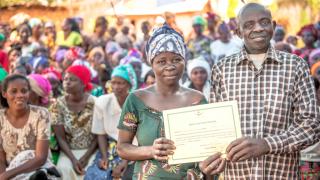
Learn more by exploring the additional resources below:
- Presentation of results of randomised-controlled trial of Women for Women International’s one-year programme in the DRC (September 2020). Available in French
- Women for Women International – DRC RCT - Summary of Results. Download here
- Women for Women International – DRC RCT: Baseline results brief. Download here
- Women for Women International – DRC RCT One-page project summary. Download here
- For additional information about this research, please contact research@womenforwomen.org
Acknowledgments:
This intervention trial was a collaborative project of Women for Women International, Dr. Rachel Heath, University of Washington, and Dr. Manuela Angelucci, University of Texas at Austin. The research team would like to thank the participants of this study for sharing their time and experiences, the Women for Women International programme implementation staff and the data collection teams, Marakuja Kivu Research and Innovative Hub for Research in Africa (IHfRA).
This research was funded by the Ministry of Foreign Affairs of the Netherlands and BlackRock. The funds were managed by Women for Women International. The views expressed in the linked documents are solely those of the authors and do not necessarily reflect the official views of the Ministry of Foreign Affairs of the Netherlands, BlackRock, University of Washington, or University of Texas at Austin.
Learn more about our work in the DRC
A Silver Lining in the DRC
subtitle:
Amid all the heavy headlines of things COVID-19 has changed or stalled, we are happy to share with you a silver lining: We are resuming our in-person trainings in the Democratic Republic of the Congo!
Since 2004, Women for Women International - Democratic Republic of Congo has reached more than 110,419 women.
Claudine
subtitle:
I know that I should take courage because I survived a hard situation. Every day, I have to wake up and pray and say, thank you God, for I’m still alive. It was hard but now I’m here.

